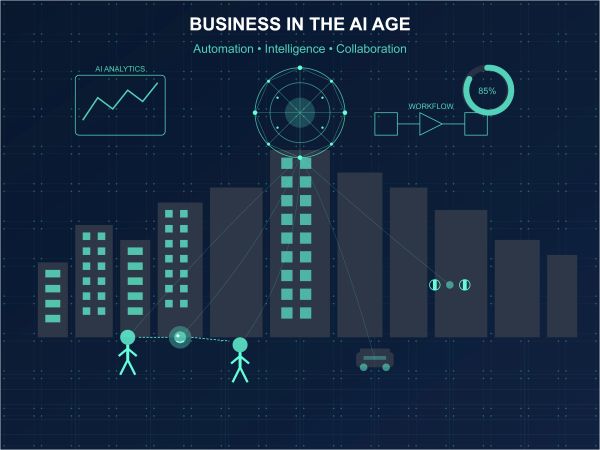
The Future of AI in Small Business: What to Expect in the Next 5 Years
The next five years promise a significant acceleration in adopting and integrating Artificial Intelligence (AI) within small businesses. No longer a futuristic concept reserved for large corporations, AI is poised to become an increasingly accessible and indispensable tool for enhancing efficiency, personalizing customer experiences, and driving growth for businesses of all sizes.
This evolution will bring about transformative changes across various operational aspects, demanding that small business owners understand and adapt to this evolving landscape.
Enhanced Customer Relationship Management (CRM)
AI will revolutionize how small businesses manage customer relationships in the coming years. Expect to see more sophisticated AI-powered CRM systems that go beyond basic data storage. These systems will leverage natural language processing (NLP) to analyze customer interactions across various channels (email, social media, chat), providing deeper insights into customer sentiment, needs, and preferences.
AI will enable hyper-personalization of marketing efforts, allowing small businesses to tailor messages and offers to individual customers with unprecedented accuracy. Predictive analytics will identify potential churn risks and opportunities for upselling or cross-selling, empowering small businesses to proactively engage with their customer base.
Additionally, AI-driven chatbots will become even more intelligent, capable of handling complex queries and providing seamless 24/7 customer support, freeing up human agents to focus on more intricate issues and relationship building.
Streamlined Operations and Automation
AI will play a crucial role in automating routine and time-consuming tasks, allowing small business owners and their employees to focus on strategic initiatives and core competencies. Expect to see wider adoption of AI in areas such as:
- Inventory Management: AI algorithms will analyze sales data, market trends, and supply chain information to optimize inventory levels, reduce waste, and prevent stockouts.
- Financial Management: AI-powered tools will assist with tasks like bookkeeping, invoice processing, expense tracking, and even financial forecasting, providing small businesses with better insights into their financial health.
- HR Functions: AI can streamline recruitment processes by analyzing resumes and identifying suitable candidates, automating onboarding tasks, and even assisting with performance management through data-driven insights.
- Task Management and Workflow Optimization: AI-powered platforms will help small teams organize tasks, prioritize workflows, and automate repetitive processes, leading to increased productivity and reduced errors.
Data-Driven Decision Making
One of the most significant impacts of AI on small businesses will be the ability to make more informed decisions based on data. AI tools will be able to analyze vast amounts of data from various sources, identifying patterns and trends that would be impossible for humans to discern manually.
This will empower small business owners to better understand their market, customer behavior, and operational efficiency. AI-driven analytics will provide actionable insights for optimizing pricing strategies, identifying new market opportunities, and improving overall business performance. Expect to see user-friendly AI dashboards that make complex data accessible and understandable for non-technical users.
AI-Powered Marketing and Sales
Small businesses with limited marketing budgets will increasingly leverage AI to enhance their marketing and sales efforts. Expect to see:
- AI-driven content creation tools: While not entirely replacing human creativity, AI can assist in generating marketing copy, social media posts, and even basic video scripts, freeing up time and resources.
- Smarter advertising campaigns: AI algorithms will optimize ad targeting and bidding strategies across various platforms, ensuring that marketing spend is used effectively to reach the right audience.
- AI-powered sales assistants: These tools can analyze sales data, identify promising leads, and even provide real-time guidance to sales teams during customer interactions.
Over the next five years, AI will become increasingly accessible and affordable for small businesses. The rise of cloud-based AI platforms and the proliferation of user-friendly AI tools will lower the barrier to entry, making these technologies available even to businesses with limited technical expertise and budgets. Expect to see more industry-specific AI solutions tailored to various small business sectors’ unique needs.
Focus on Ethical Considerations and Data Privacy
As AI becomes more integrated into small business operations, ethical considerations and data privacy will become increasingly important. Small business owners will need to be mindful of potential biases in AI algorithms and ensure that customer data is handled responsibly and in compliance with evolving regulations. Transparency in how AI is used and clear communication with customers about data collection practices will be crucial for building and maintaining trust.
The Need for Upskilling and Adaptation
The integration of AI will necessitate a degree of upskilling and adaptation for small business owners and their employees. While AI will automate many tasks, human skills such as critical thinking, creativity, emotional intelligence, and complex problem-solving will remain essential. Small businesses that invest in training their workforce to work alongside AI will be better positioned to thrive in this evolving landscape.

 How AI Can Help Your Business
How AI Can Help Your Business